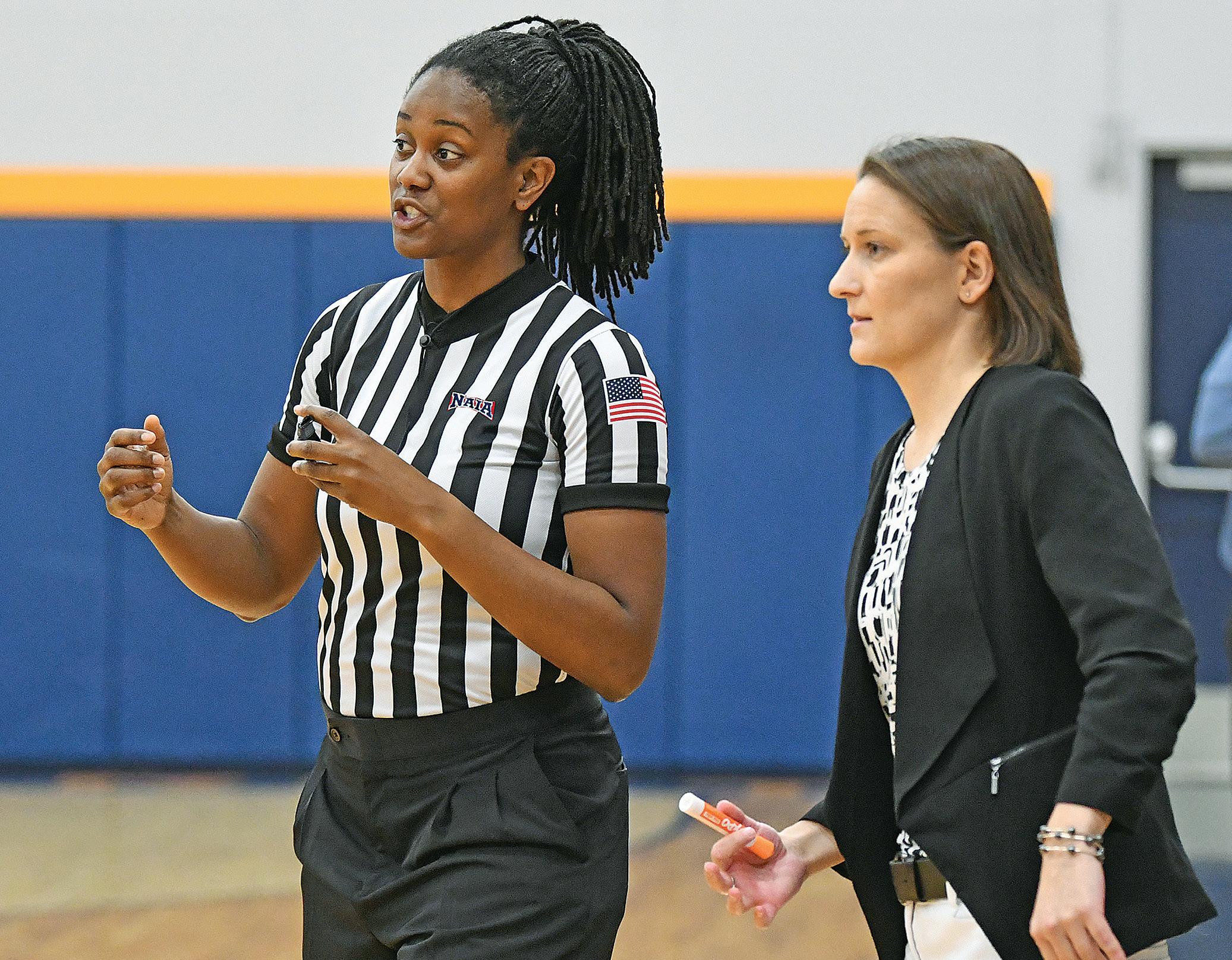
11 minute read
ALL SPORTS
By speaking to the coach in a respectful and confident manner, Jessica Wilkinson, Seattle, is boosting her credibility and image.
YOUR VERY OWN SIX PACK
A Half-Dozen Great Tips to Elevate Your Game
By the Referee Editors
As odd (or unfair) as it seems, you’re often judged by little things you do that get noticed rather than your two most crucial skills. While there is no substitute for strong rules knowledge and solid mechanics, the best officials also possess qualities independent of those skills. They have a demeanor or confidence about them that sets them apart from most officials. How can you rise above the rest and, with minimal effort, make yourself look better to everyone who views your performance?
The following is a compilation of six “little things” you can do starting with your next assignment that will enhance your performance, improve your image, increase your confidence and simply make you a better official. 1.Movement. Hustle is simply a matter of being dedicated to being in position and looking interested and athletic during your games. If you know where to go, it’s usually a lot easier to get there.
Get as close to the ideal position as possible, while ensuring: •You are not running when the play actually happens. Bouncing eyes distort your vision. •You don’t interfere with the play. It is possible to be too close. •You don’t leave a potential
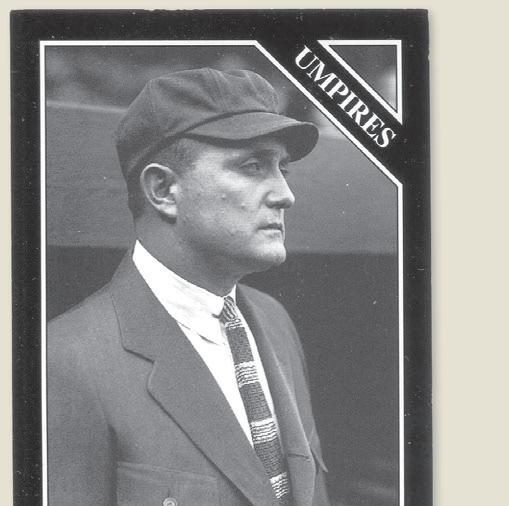
secondary play uncovered. If you’re working alone, that is essential. 2.Appearance. One of the few areas in officiating in which you have complete control is your appearance. You have little to no control over how close the game will be or the manner in which it is played, but if you look like you don’t care how others see you, you have no one to blame but yourself.
No one should underestimate the value of appearance. Buy the standard apparel and equipment for your level of play and wear them properly. Iron your shirts and pants and shine your shoes. Dress professionally when arriving at your locker room before the game. Looks are seldom deceiving; make sure your first impression is one you don’t have to overcome.
3.Convey confidence through
your speech. Speak in a confident yet friendly tone. Give a firm handshake when introducing yourself to players and coaches. Cover everything you need to cover in the pregame, offer to answer any questions (that indicates a willingness for two-way communication) and always adjourn with a sincere “good luck” to all parties.
Too often, officials look upon pregame meetings as a formality rather than an opportunity. Transmit enthusiasm about the game ahead and it often extends to those around you. The reverse can also be true. If you give off a vibe you don’t want to be there, everyone will pick up on the negativity and you’ll get things off on the wrong foot. 4.Signal properly. Using proper mechanics is fundamental to good officiating, but signaling effectively is probably the area requiring the most practice on your part. How to make a call can make or break you as an official. Consider this example: There is a close call at home plate in a tie game. Plate umpire Pat makes the right decision, but makes a very unsure signal, combined with a voice barely audible to the participants. Plate umpire Jody makes the wrong decision, but uses a loud, confident voice, followed by a demonstrative signal.
Which umpire is going to catch the most heat? You can make the argument both are going to hear about it. You can also argue it is better to be the umpire who was right. But the bottom line is in nearly all instances, the more vocal and confident official will be perceived as the better of the two.
Practice your signals in front of a mirror until they are crisp and sharp every time.
5.Address others respectfully.
When you talk to players or coaches, be polite and respectful. There are varying opinions regarding addressing coaches by their first names. You can never go wrong with “Coach.” Avoid referring to one coach by name but not the other; it can give the unfamiliar coach the impression the opponent is getting favorable treatment.
Additionally, such forms of address as “buddy,” “pal,” or “kid” are disrespectful and flippant and should never be used. Refer to players by their number or position. Respect is a two-way street and must be given before it is received. 6.Make eye contact. Looking people in the eye when you talk to them adds to the perception you’re confident and in control, not to mention it is polite and respectful — qualities that are often reciprocated if demonstrated.
While there are game situations when eye contact is not possible, or even necessary, the idea is never to avoid such contact. People don’t always notice or remember when you maintain eye contact with them, but they absolutely know when you avoid it.
If you really want to be a better official, you can. The little things are often the difference between good and great officials. The best are those who combine a vast knowledge of rules and excellent mechanics with the subtle yet noticeable habits and skills you’ve just read about.
Strive to be that kind of official. By going that extra mile, by improving just a little bit at a time, it shows you are willing to give an effort and you care about our avocation.
TOOLS
Ringside
Ringside is a new book from former official and NASO board member Marc Ratner. From the gridiron as a collegiate official to the bright lights of the UFC, Ratner has been an influential figure in sports for more than 50 years. From his dealings with former heavyweight boxing champions Sonny Liston and Mike Tyson to his induction into the UFC Hall of Fame, Ratner relates his journey to the top. Available from retailers such as Amazon.com, the book sells for $14.99.
QUICKTIP
If you told a coach you’d check
on a rule, do it. Get back to him or her as quickly as possible. Don’t gloat if your original ruling proves correct; explain the ruling as if you had nothing to do with the call. If you made the wrong call, admit it. Most coaches respect officials who admit errors, and doing so adds to your credibility. Caution: Too many errors is a problem .
THEY SAID IT
“Good eyes, plenty of courage — mental and physical — a thorough knowledge of the playing rules, more than average portions of fair play, common sense and diplomacy, an entire lack of vindictiveness, plenty of confidence in your ability.”
— Hall of Famer Billy Evans, when asked what qualities make a good umpire
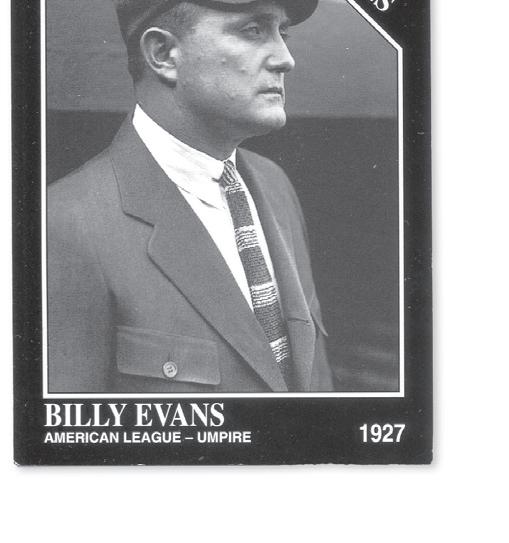
Review, Renew and Recover
So the season is over. You’re off for a few months and you’re enjoying some well-earned time away from rude fans, angry coaches and obstinate players.
It’s a great time to look back on the season just finished. Your games are as fresh in your mind as they ever will be. As playoff games are wrapped up and championships are awarded, the time for selfassessment becomes more important than ever. Here are some ideas to help you evaluate your season and prepare for the next.
How did you hold up physically?
After a full schedule of regular-season and postseason contests, are your legs sore and tired? If you noticed a gradual breakdown in your ankles or knees, different methods of fitness preparation for next season might be necessary. If your lower back became a problem, work on ways to increase your flexibility before next season rolls around.
How did you hold up mentally?
If the season became a grind in the waning months and you noticed yourself wishing you had a night off, plan next season’s schedule accordingly. It’s only natural to want to work as many games as possible, especially with the ongoing shortage of officials, but was it feasible? Did your work or home life suffer? If so, don’t be afraid to schedule some appropriate off nights for next season. Schedule an entire weekend off and use it as a way to re-energize yourself for the stretch run.
Were you faced with any crazy
situations? Document the times you were unsure of yourself. It might have been rule-based. If your rules study needs work, make a plan to study the rulebook in increments throughout the year instead of cramming two days before the season or your first preseason test.
Was there a particular area of
weakness? Don’t be afraid to look in the mirror and determine what areas of your officiating need work. If calling a particular foul or violation seemed like your most difficult call throughout the season, continue to try to determine it when watching games on television or watching your own games on video.
Attend camps you believe will impact your officiating in a positive way.
Did you enjoy yourself?
Extremely basic, but it is probably the most important question of all. For most, officiating is an avocation. Not every game is going to be a walk in the park. There will be difficult times. But look at the season as a whole. If you are so ingrained in the routine of officiating that you rarely enjoy it, it’s time to reevaluate. That may sound harsh, but if making the big call in the big game no longer creates excitement in your mind, think about that. It may be time to hang it up before the game passes you by.
The Last Game
By the Referee Editors
Few if any officials enjoy long games. Whether it be overtime or extra innings, one-sided games or those that simply have no pace and take forever to complete, we just don’t like being on the court or field beyond what we figure is our normal time. It’s especially unpleasant when the weather is oppressively hot, uncomfortably cold, or damp and drizzly.
Outside forces are going to be working against you as well. Tension increases. Tempers get shorter, whether it’s the players, coaches or fans. Rulings take on added significance in extra innings or overtime. Staying in control requires extra effort.
It’s easy to become dispirited as a game drags on. You can find yourself wishing calls you made
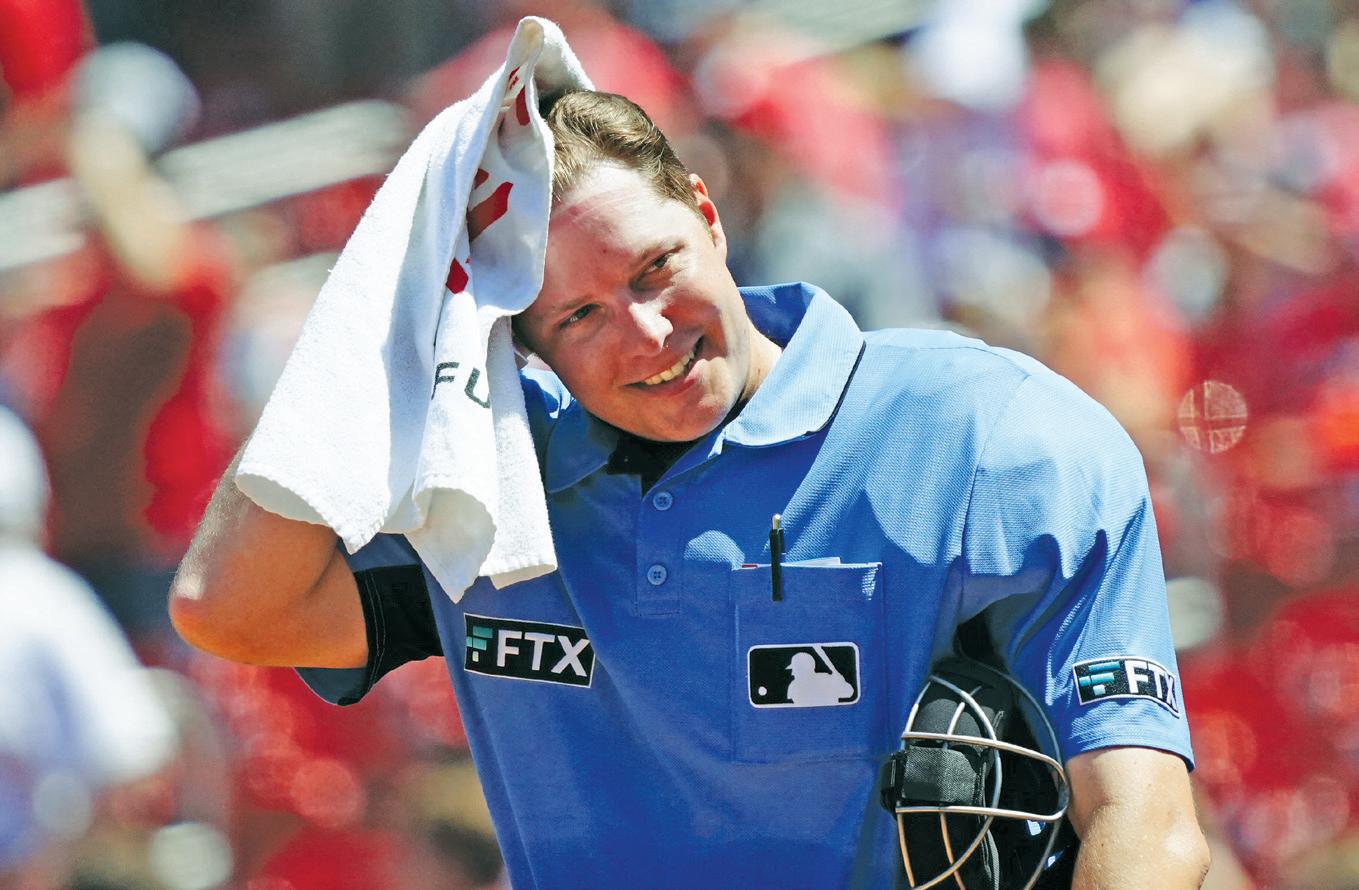
MLB umpire Clint Vondrak towels off between innings. Heat and humidity make for an uncomfortable work environment any time, but it can be especially troublesome if a game goes extra innings. Maintaining your concentration during long games is difficult but necessary.
earlier in the game had gone the other way so the game would have ended already. That sort of thinking gets you nowhere. For one thing, it breaks your concentration and may lead to you missing the next play. Wondering how long the game will last or dwelling on the length of the game are also counterproductive.
So how do you stay focused and attentive as your physical strength wanes and your mental energy ebbs?
As difficult as it sounds, try to stay positive mentally. Relax and focus on the next play. Don’t psych yourself out with negative thinking.
To keep yourself sharp, mentally review your keys or coverages before each pitch or play. Prepare yourself by remembering the teams’ tendencies and strategies. Keep your head in the game so thoughts of how long you’ve been out there will be pushed aside.
Hydration is important when working long games. When game breaks allow, replace fluids. In fact, you should anticipate the potential for long games by drinking water before you arrive at the game. Start the night before or even earlier.
Officials of outdoor sports must consider game conditions. If you’ve checked the forecast before the game and you’ve dressed properly, comfort shouldn’t be a distraction or a concern. Remember, though, weather can go from one extreme to another. If you need to add or shed a layer, do so during an appropriate break.
Once the game finally ends, it’s important to stretch those tired muscles. It sounds odd, considering all the time you were on your feet. But the postgame stretch is vital for preventing cramping and future injuries. When you get home, remember the RICE method for pulled muscles: Rest, Ice, Compression, Elevation.
It’s tough to be at your best for an extended length of time, but that’s part of the job. Work the game from start to finish. And you’ll have a great war story to tell your officiating colleagues about the “game that wouldn’t end.”
softball
From pre-pitch placement, taking the sign and the delivery, to illegal pitches, this book has everything you need to know about the pitcher. YOUR COMPLETE GUIDE TO PITCHING *NASO member discount available.$1395* DIGITAL In baseball, the pitcher makes the world go baseball GUIDE TO PITCHINGCOMPLETE round. As umpire, you have to know what they can and can’t do, inside and out.
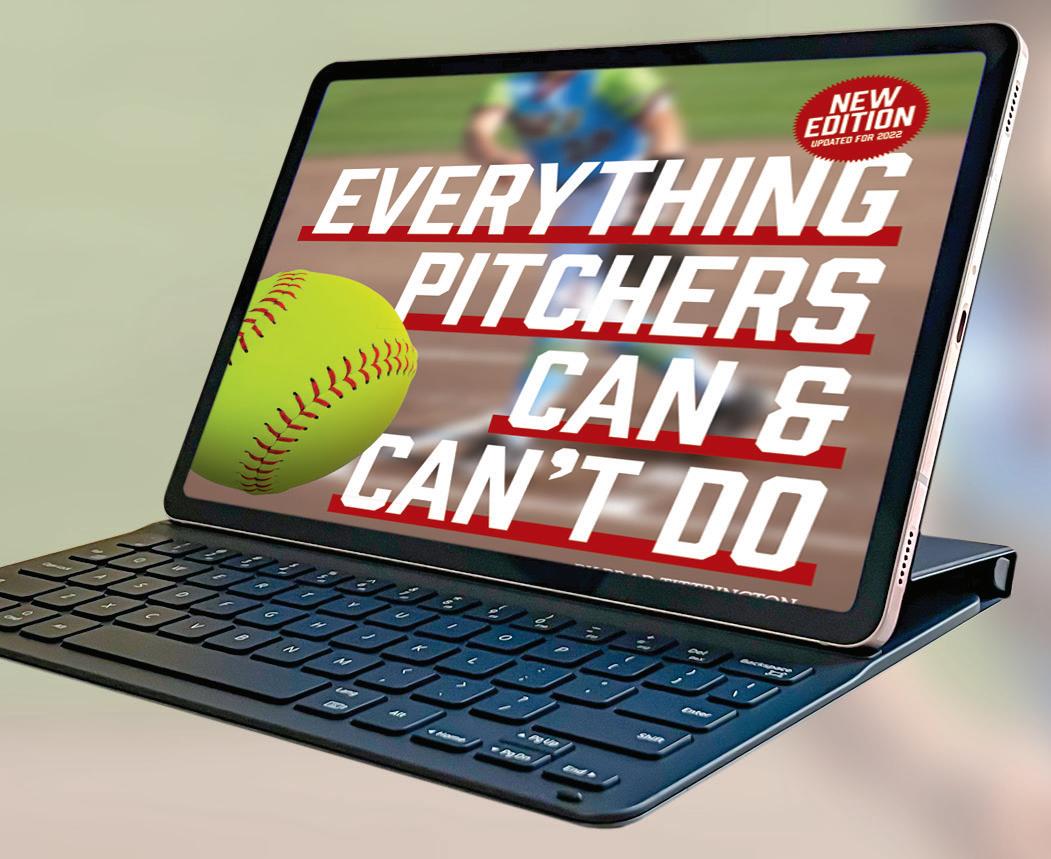

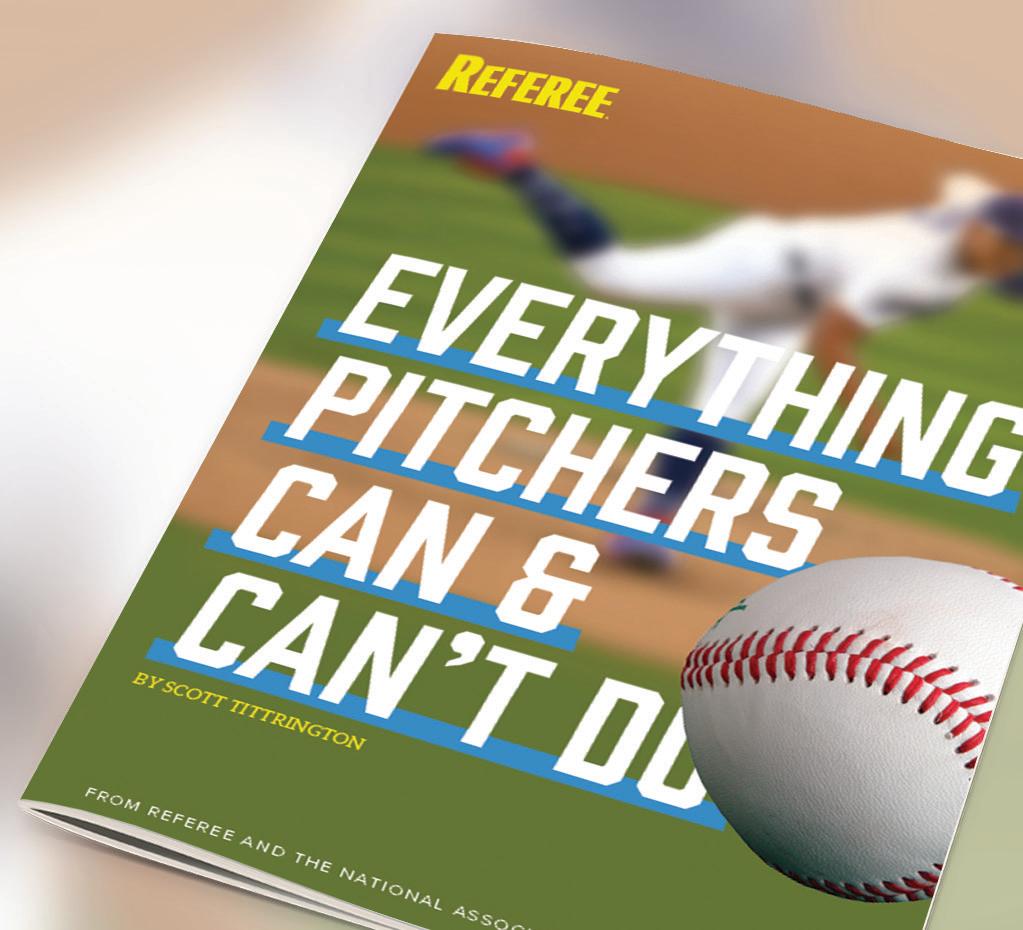



DIGITAL PRINT $1395* $1595*
COMBO $2095









